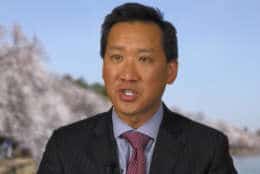Retirement
-
Can you afford to retire? If not, what do you need to do to grow your retirement nest egg? Find out when federal benefits expert John Grobe, joins host Mike Causey on this week's Your Turn. May 2, 2018
May 02, 2018 -
John Grobe, a former fed and benefits specialist, crunch some numbers you need to know before you retire from a federal career.
May 02, 2018 -
New Office of Personnel Management Director Jeff Pon detailed his vision for OPM and its role in modernizing 40-year-old statutes that govern how agencies recruit, retain, compensate and manage federal employees.
April 30, 2018 -
Some clever, eligible federal workers are considering retiring later this year to be on the retirement roles for the January 2019 cost of living adjustment. But the problem is that time is not on their side.
April 30, 2018 -
Lyn Alden, who provides equity research and investment strategies, describes why the Federal Retirement Thrift Investment Board’s decision to expand the I Fund is a good one.
April 27, 2018 -
The 150-member Republican Study Committee has listed its budget priorities for 2019, calling for eliminating all automatic pay raises for federal workers, and increasing their contributions to their own retirement. The conservative group's also wants to make it easier for federal employees to be fired.
April 27, 2018 -
Most federal workers and retirees are covered by one of the dozens of plans and any of them do not need Medicare Part B, but it does offer extra protection.
April 26, 2018 -
Federal News Radio digital editors and writers David Thornton and Terry Wing will answer common questions about teleworking and Federal News Radio reporter Nicole Ogrysko will explain why some TSP investors are not taking full advantage of the TSP's blended retirement plan. April 25, 2018
April 24, 2018 -
The two primary unions representing postal workers support a bipartisan postal reform bill in March, while the National Active and Retired Federal Employees opposes it for fear it will force retirees to take Medicare Part B.
April 24, 2018 -
About 20,000 new opt-ins to the blended retirement system aren't taking full advantage of the Thrift Savings Plan and its benefits.
April 23, 2018 -
The American Federation of Government Employees and have endorsed congressional candidates whom they hope will advocate for federal worker pay going forward.
April 20, 2018 -
The first quarter of 2018 has not been a good one for the Thrift Savings Plan. Why? Find out when financial planner Arthur Stein joins host Mike Causey on this week's Your Turn radio show. April 18, 2018
April 17, 2018 -
Financial planner Arthur Stein said the last 12 months of TSP returns were not all bad.
April 17, 2018 -
January 2019 prospects are not nearly so good for feds who are still on the job. White collar, nonpostal civil servants face the prospect of a pay freeze.
April 16, 2018 -
Are proposals to freeze federal pay and cut retirement benefits just political talk or, as one retiree put it, a reasonable menace?
April 13, 2018















